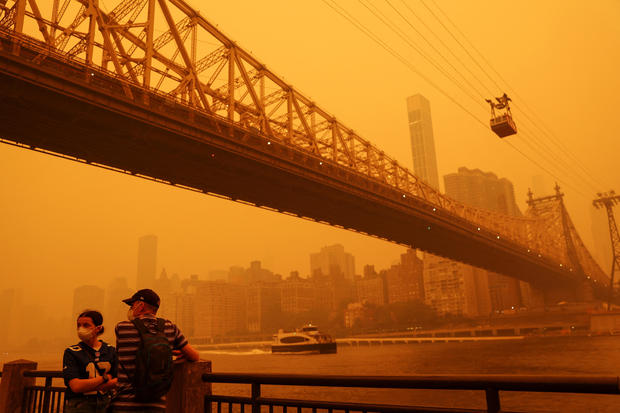Extreme fire weather fueled by climate change played significant role in Canada's wildfires, new report says
Extreme fire weather conditions fueled by climate change contributed to the increased severity of eastern Canada's wildfire season this spring, a new report from the World Weather Attribution revealed.
The World Weather Attribution is an association of global climate scientists who analyze extreme weather events to determine whether or not climate change played a role in them.
The report, published on Tuesday, also determined that the fires, which burned across 13 million hectares of land through May and June, were linked to "very large-scale impacts on air quality."
"The Canadian wildfires have severely impacted air quality locally in Canada, and in the neighboring United States with Air Quality Index values frequently exceeding safe levels in the midwest and northeast USA, and in some cases approaching record levels," the report said.
The consequences of the damaged air quality reached well beyond areas burned by the fires and threatened the "health, mobility, and economic activities of people across North America."
Schools and outdoor public events were canceled for several days across Ontario, Ottawa and Toronto, as well as in U.S. states such as New York, New Jersey and Connecticut.

The study pointed to fire weather as a major reason for the extensive wildfires that caused smoky skies across the east coast of North America earlier this year. In fact, Canada experienced its warmest May-June period since 1940. Humidity levels were also very low, creating even warmer and dryer conditions.
These changes in temperature and humidity were both driven by human-induced warming, the study concluded, although the conditions were further intensified by unusually low rainfall this year.
If climate change continues on this path and the world gets 2 degrees Celsius warmer, which it is on the path to do, the likelihood and intensity of extreme fire weather and resulting wildfires are projected to increase. Currently, "moderately extreme events," such as this year's wildfires in Canada, are expected to occur every 20 to 25 years, the report said.
"Climate change made the cumulative severity of Québec's 2023 fire season to the end of July around 50% more intense, and seasons of this severity at least seven times more likely to occur," the study explained. "Peak fire weather like that experienced this year is at least twice as likely, and the intensity has increased by about 20% due to human-induced climate change."
As fire season intensifies, the report recommends changes to fire management strategies as well as an increase in resources dedicated to managing these events.
- In:
- Climate Change
- Air Quality
- Wildfires
- Canada
Simrin Singh is a social media producer and trending content writer for CBS News.
Disclaimer: The copyright of this article belongs to the original author. Reposting this article is solely for the purpose of information dissemination and does not constitute any investment advice. If there is any infringement, please contact us immediately. We will make corrections or deletions as necessary. Thank you.
Title:Extreme fire weather fueled by climate change played significant role in Canada's wildfires, new report says
Url:https://www.investsfocus.com









